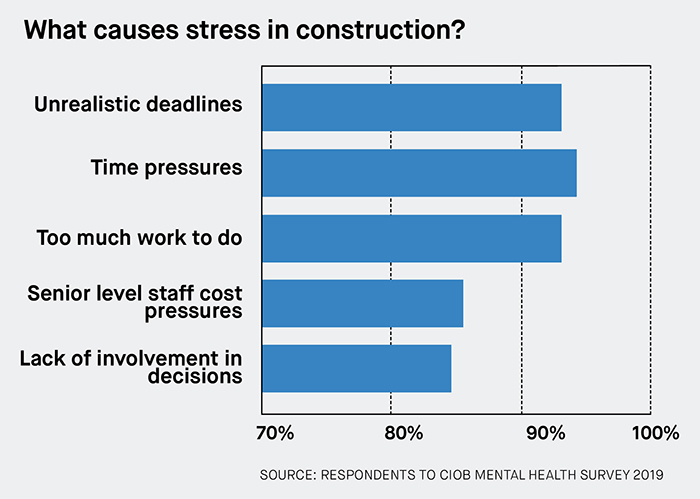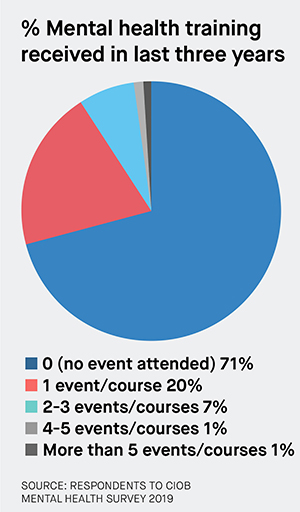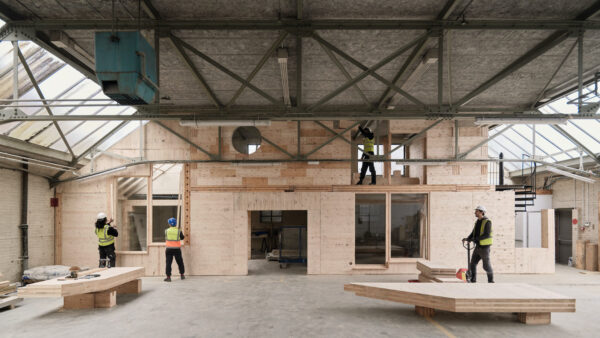Ahead of mental health awareness week, a CIOB study warns that measures to safeguard workers will be critical in rebuilding the industry after the covid-19 lockdown. Neil Gerrard reports
Mental health in construction was already a key concern for the construction industry before the coronavirus crisis started. As the industry grapples with the fallout from the pandemic, the issue could become absolutely critical, new research conducted by the CIOB shows.
The CIOB’s report, Understanding Mental Health in the Built Environment, launched to coincide with Mental Health Awareness Week (18-24 May), has uncovered some stark findings.
Related:
- Morgan Sindall’s Peter Whitmore: A sense of community is key to construction’s mental health
- Could coronavirus herald a new era of collaboration?
According to the survey, which received 2,081 responses from construction workers of all levels around the world, 26% of construction workers had experienced suicidal thoughts and 97% experienced stress at some point over the past year.
Having been conducted in August 2019, the CIOB’s survey takes no account of coronavirus. But CIOB president Professor Charles Egbu, pro-vice chancellor at the University of East London, cautions that the Covid-19 pandemic could easily exacerbate construction’s “silent mental health epidemic”.
He says: “We know that the coronavirus outbreak is affecting the way many of us live, work, and play, and in recent days it has become extremely difficult for individuals who are doing their best in extreme circumstances.”

Egbu urges those whose mental health problems have been compounded by coronavirus to seek help. “We encourage those who are experiencing anxiety, stress or other mental health issues to use resources such as the Construction Industry Helpline, Anxiety UK, and the CIOB Benevolent Fund during these difficult times,” he says.
Industry pressures
Mental health issues are not specific to construction, with one in four people experiencing poor mental health each year – ranging from common problems like depression and anxiety to less common conditions like schizophrenia and bipolar disorder.
But the CIOB’s report asserts that several features of the industry, including limited-term contracts, long hours, long commutes, time away from family, and the pressure to complete on time and within budget are just some of the contributing factors to poor mental health within construction.
Egbu explains that the CIOB decided to launch its report for these reasons: “In recent years, mental health and wellbeing has gained more attention in the media, leading to increased public and business awareness. For construction, this issue runs through the industry, affecting decision-making from the boardroom through to site. The CIOB’s Understanding Mental Health in the Built Environment report helps shed light into the current state of mental health within the industry.”
Stress, in particular, appears to pervade the industry at all levels. Egbu notes that 97% of respondents said they had experienced “some degree” of stress over the past year. Some 90% of manual workers said they experience moderate to extreme levels of stress due to poor communication within their organisation and 64% said they also experienced stress due to bullying. Meanwhile 65% of senior staff find inadequate staffing causes moderate to extreme levels of stress.

The nature of construction work means that tight deadlines are likely to cause stress, and the report found that 94% experienced stress due to time pressures.
Physical factors involved in construction work can also manifest themselves in mental health problems. A total of 80% of respondents to the CIOB’s survey said noise levels were stressful, while 79% found inadequate temperature control difficult to deal with.
Some 71% of manual workers report experiencing stress as a result of inadequate toilet facilities, while 66% struggled to deal with the uncertainty of their working location.
The good news is that the industry is waking up to how important it is to maintain good mental health among its workforce.
The CIOB study found that 38% of respondents said their organisation offered helplines, while just over a third (35%) said their organisation offered mental health first aiders. But only 5% offered fatigue management plans and less than a third (31%) said their organisation would treat a mental health issue seriously.
Many companies have not yet even developed a policy for mental health, with 56% of respondents claiming that their organisation had one. Meanwhile, fewer than three in 10 have received any mental health training over the past three years (see pie chart).
The CIOB report describes the issue of mental health in construction as a “silent epidemic”. Of course, that terminology is now inextricably linked to the coronavirus crisis, which could well overshadow concerns about mental health in construction.
Tackling the issue
The CIOB has come up with a series of recommendations to tackle the issue of mental health, directed at the industry itself, as well as government, and professional bodies (see below).
In an age where the coronavirus has effected huge changes in every aspect of people’s lives, as well as placing huge burdens on their mental health, such measures are likely to be even more important than ever.
But, Egbu concludes, the situation could lead to change for the better when it comes to construction workers’ mental health.
He says: “The crisis has forced many of those in construction to work from home and to take a more flexible approach, and it has pushed the industry to communicate more and work collaboratively to meet shared goals. This report explores the support out there for those who need it, and that we all need to work together to address the silent epidemic that is mental ill health, both during the coronavirus outbreak and after.”
The CIOB’s recommendations
How organisations can tackle mental health in construction
Industry
- Produce, communicate and implement a mental health at work plan.
- Develop mental health awareness among employees.
- Encourage a culture of openness around mental health and the support available for all employees.
- Train managers and supervisors in mental health awareness and promote effective people management.
- Routinely monitor employee mental health and wellbeing as well as identify risks that could contribute to poor mental health.
- Ensure employees have access to good quality mental health support and training, such as counselling skills or mental health awareness training (BACP).
- Offer stress reduction approaches to work, such as mindfulness, to support those experiencing stress.
- Recommend a more targeted mental health approach for individual workers experiencing mixed anxiety and depression, such as talking therapy treatment.
- Larger organisations should look at how they can support their supply chain and smaller organisations who work on projects with them.
Government
- Create a government-led root and branch review of health and safety legislation with a view to strengthening protection and promotion of mental health.
- Act on calls from campaigners, businesses and the general public to amend the Health and Safety (First Aid) Regulations 1981 so they are explicit that First Aid obligations relate to both mental and physical health.
- Implement the recommendations from the Thriving at Work: A review of mental health and employers report.
- Work with employers to ensure they support the mental wellbeing of their staff and implement
the recommendations. - Continue to fund the Time to Change campaign at its current level to help end the stigma and discrimination often experienced by people with mental health problems.
- Appoint the first minister for suicide prevention.
Professional bodies
- Develop mental health awareness among members.
- Provide guidance for members to help them manage their own mental health.










